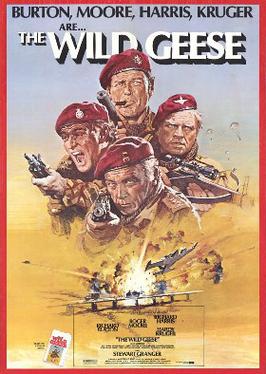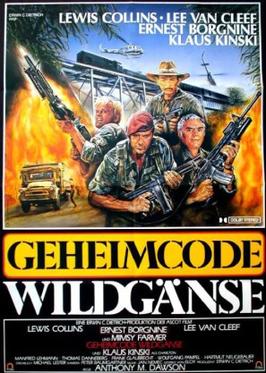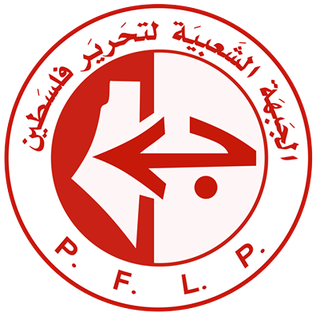
The Sabra and Shatila massacre refers to the 1982 killings of between 460 and 3,500 civilians—mostly Palestinians and Lebanese Shias—in the city of Beirut during the Lebanese Civil War. It was perpetrated by the Lebanese Forces, one of the main Christian militias in Lebanon, under the command of Lebanese politician Elie Hobeika. The killings were carried out in Beirut's Sabra neighbourhood and in the adjacent Shatila refugee camp. Two days earlier, on 14 September, Lebanese politician Bachir Gemayel had been assassinated, prompting the Phalangists to call for a revenge attack.


Spandau is the westernmost of the 12 boroughs of Berlin, situated at the confluence of the Havel and Spree rivers and extending along the western bank of the Havel. It is the smallest borough by population, but the fourth largest by land area.
Wolf Rüdiger Hess was a German architect, the only son of Rudolf Hess and Ilse Hess.

The Wild Geese is a 1978 war film starring an ensemble cast led by Richard Burton, Roger Moore, Richard Harris and Hardy Krüger. The film, which was directed by Andrew V. McLaglen, was the result of a long-held ambition of producer Euan Lloyd to make an all-star adventure film in the vein of The Guns of Navarone or Where Eagles Dare. The plot concerns a group of European mercenaries fighting in Africa. The screenplay by Reginald Rose was based on Daniel Carney's unpublished novel The Thin White Line.
Lieutenant Colonel Eugene K. Bird was US Commandant of the Spandau Allied Prison from 1964 to 1972 where, together with six others, Deputy Führer Rudolf Hess was incarcerated.
The Popular Front for the Liberation of Palestine – External Operations or Special Operations or Special Operations Group were organizational names used by Palestinian radical Wadie Haddad when engaging in international attacks, which were not sanctioned by the Popular Front for the Liberation of Palestine (PFLP).

The Revolutionary Cells were a self-described "urban guerrilla" organisation that was active between 1973 and 1995. The West German Interior Ministry described it as one of West Germany's most dangerous leftist terrorist groups in the early 1980s. According to the office of the German Federal Prosecutor, the Revolutionary Cells claimed responsibility for 186 attacks, of which 40 were committed in West Berlin.
Like piracy, the mercenary ethos resonates with idealized adventure, mystery, and danger, and appears frequently in popular culture. Many are called adventurers, filibusters, soldiers of fortune, gunslingers, gunrunners, ronin, and knights errant.

The Indian Scarf is a 1963 West German crime film directed by Alfred Vohrer. It was part of a very successful series of German films based on the writings of Edgar Wallace and adapted from the 1931 play The Case of the Frightened Lady.

Code Name: Wild Geese is a 1984 West German-Italian Euro War film directed by Antonio Margheriti and starring Lewis Collins in the first of their three mercenary war films. Despite the films title, Code Name: Wild Geese is not the sequel to The Wild Geese film, but a derivative film. Kim Newman described the film as closer to the director's films such as The Last Hunter and Cannibal Apocalypse.

Wild Geese II is a 1985 British action-thriller film directed by Peter Hunt, based on the 1982 novel The Square Circle by Daniel Carney, in which a group of mercenaries are hired to spring Rudolf Hess from Spandau Prison in Berlin. The film is a sequel to the 1978 film The Wild Geese, which was also produced by Euan Lloyd and adapted from a novel by Carney. Richard Burton, who starred in the first film as Colonel Allen Faulkner, was planning to reprise his role, but died days before filming began. Faulkner is replaced by his brother played by Edward Fox as one of the mercenaries. No characters from the original are featured in the sequel.

Spandau is a locality (Ortsteil) of Berlin in the homonymous borough (Bezirk) of Spandau. The historic city is situated, for the most part, on the western banks of the Havel river. As of 2020 the estimated population of Spandau was 39,653.

The Wild Geese is a 1978 novel by Rhodesian author Daniel Carney published by Bantam Books. He originally titled it The Thin White Line, but it went unpublished until its film adaptation The Wild Geese was made.

Carlos, also known as Carlos the Jackal, is a 2010 French-German biographical film and television miniseries about the life of Venezuelan terrorist Ilich Ramírez Sánchez, nicknamed Carlos the Jackal, covering his first series of attacks in 1973 until his arrest in 1994. It premiered as a three-part TV mini-series on French pay channel Canal+, with the three parts airing on May 19, May 26, and June 2, 2010. On the same day it premiered on Canal+, the full 5½-hour version was also shown out of competition at the 2010 Cannes Film Festival.

Rudolf Walter Richard Hess was a German politician and a leading member of the Nazi Party in Nazi Germany. Appointed Deputy Führer to Adolf Hitler in 1933, Hess held that position until 1941, when he flew solo to Scotland in an attempt to negotiate the United Kingdom's exit from the Second World War. He was taken prisoner and eventually convicted of crimes against peace. He was still serving his life sentence at the time of his suicide in 1987.
Operation Starvation is the seventeenth novel in the long-running Nick Carter-Killmaster series of spy novels. Carter is a US secret agent, code-name N-3, with the rank of Killmaster. He works for AXE, a secret arm of the US intelligence services.

The Popular Front for the Liberation of Palestine is a secular Palestinian Marxist–Leninist and revolutionary socialist organization founded in 1967 by George Habash. It has consistently been the second-largest of the groups forming the Palestine Liberation Organization, the largest being Fatah.
The Hepp-Kexel-Group was a right-wing terroristic gang in West-Germany. The gang perpetrated bank robberies and attacks in the early 1980s; its members came from the main far-right terrorist gang of this time, the Wehrsportgruppe Hoffmann. The Hepp-Kexel group was until the self-release of the NSU as the most important right-wing terrorist group in the Federal Republic of Germany.
Fatima Hadad is a Moroccan singer and artistic director. She is an exponent of the Moroccan sung poetry known as Malhun. In 2004 she founded a society for others interested in this Moroccan cultural heritage.